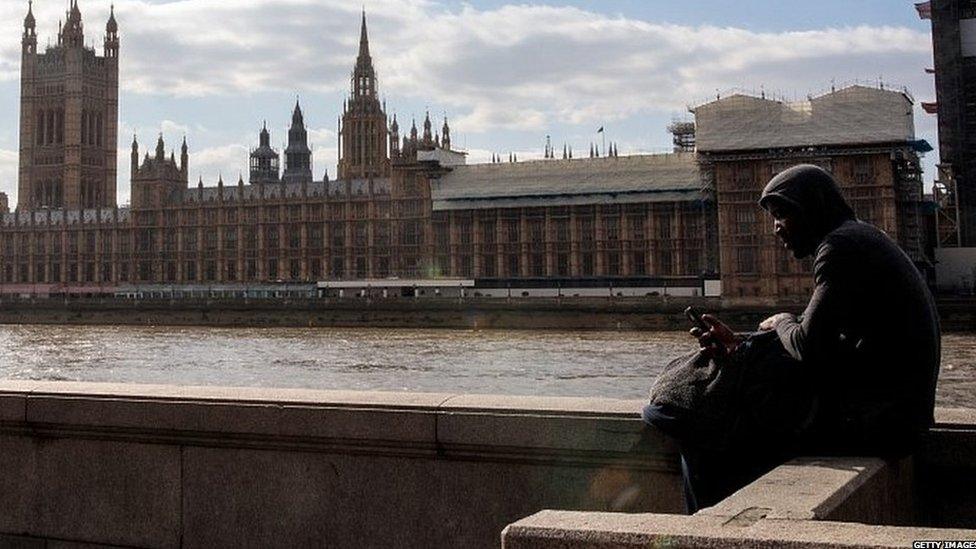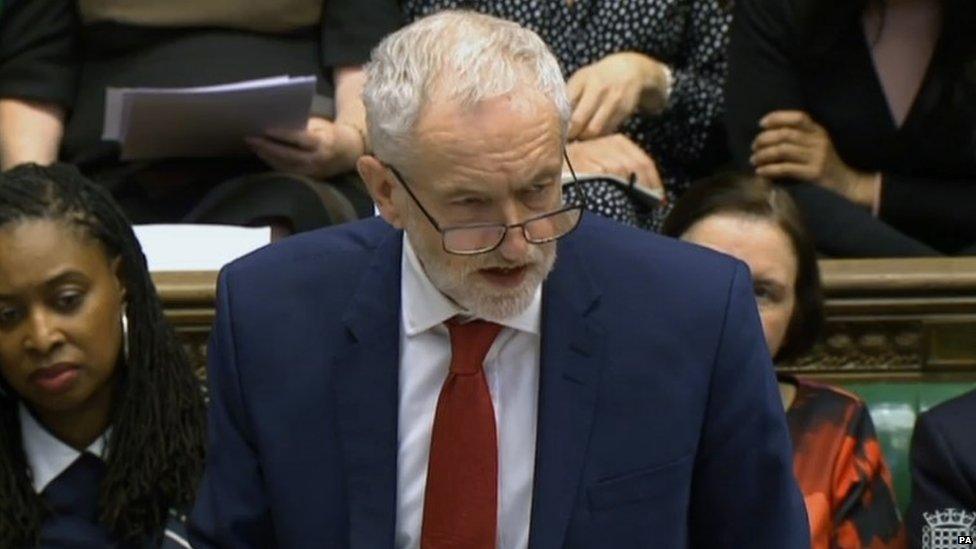Brexit votes: The lowdown on MPs' alternative plans
- Published

MPs are trying to forge a Brexit consensus as they debate and vote on alternatives to the government's EU withdrawal agreement.
In an unprecedented show of strength by the Commons, MPs are wresting control of the parliamentary timetable from the government for a few hours to consider a range of other options and try to break the current deadlock.
Commons Speaker John Bercow has chosen eight proposals, out of more than a dozen put forward by MPs, to be debated.
It will then be up to MPs, when they fill in their ballot papers, to express an opinion on each of them.
Any that secure the support of more than 50% of MPs could go forward to be debated again on Monday as Parliament tries to convince the government, and just as importantly the EU, that it has an alternative solution.
Here's a brief rundown of proposals up for consideration and who's backing them.
No-deal Brexit
The general idea: It's a very straightforward motion: "That this House agrees that the UK shall leave the EU on 12 April 2019 without a deal."
The key bits: It seeks to ensure that there will not be further delay to Brexit.
Who's backing it? Conservative Brexiteers John Baron, Sir David Amess, Martin Vickers and Stephen Metcalfe
A customs union
Allow X content?
This article contains content provided by X. We ask for your permission before anything is loaded, as they may be using cookies and other technologies. You may want to read X’s cookie policy, external and privacy policy, external before accepting. To view this content choose ‘accept and continue’.
The general idea: At least three motions were being circulated around Westminster which argue for the UK to negotiate a permanent customs union with the EU. The Speaker has selected the most straightforward one, tabled by veteran Tory MP Ken Clarke.
The key bits: It does not argue for the UK to remain in the EU's current customs union. It says that any EU withdrawal agreement, and declaration on the future trading relationship, "must include, as a minimum, a commitment to negotiate a permanent and comprehensive UK-wide customs union with the EU".
Who's backing it? The cross-party proposal has the backing of a smattering of senior Conservative and Labour MPs, including Ken Clarke, Oliver Letwin, Hilary Benn and Yvette Cooper.
Labour's plan

The general idea: Aside from the customs union, the opposition's motion unarguably points in the direction of a "softer Brexit" while, the party insists, still honouring the result of the 2016 referendum. Labour argues that its proposal is negotiable with the EU - something its detractors contest.
The key bits: The motion calls for "close alignment" with the single market, underpinned by shared institutions and obligations, and for the UK to be in harmony with laws on workers' rights and environmental protections. It seeks guarantees over the UK's continued participation in educational, scientific and cultural programmes and access to security and law enforcement schemes, including the European Arrest Warrant.
Who backing it? It is being put forward by party leader Jeremy Corbyn and his Brexit spokesman Sir Keir Starmer. But it is unlikely to attract much support from other parties, particularly opposition parties who favour another referendum.
Common Market 2.0
Allow X content?
This article contains content provided by X. We ask for your permission before anything is loaded, as they may be using cookies and other technologies. You may want to read X’s cookie policy, external and privacy policy, external before accepting. To view this content choose ‘accept and continue’.
The general idea: Also known as "Norway plus", this motion takes as its starting point the Scandinavian country's relationship with the EU and seeks to build on it. It derives its name from the common market, the vernacular name for the European Economic Community (EEC) at the time the UK joined it in 1973.
The key bits: The UK would reapply to join the European Free Trade Association (EFTA), which it left when it signed up to the EEC. If successful, it would join what is known as the "EEA pillar" of the EFTA agreement. In essence, the UK would not leave the European Economic Area, to which it currently belongs as an EU member, and would continue to participate in the single market. It envisages a "comprehensive customs arrangement" with the EU until alternative arrangements are put in place and would maintain freedom of movement, albeit with conditions.
Who's backing it? It is the brainchild of Tory MP Nick Boles, who has been championing it for nearly 18 months. It has the support of Brexiteer Tory Andrew Percy and a number of Labour MPs, including Stephen Kinnock. The Labour leadership has indicated it will order its MPs to vote for this, increasing its chances of success.
EFTA/EEA
The general idea: This is similar in some respects to Common Market 2.0 but with a number of important differences. While the UK would rejoin EFTA and stay within the EEA, it makes clear the UK's rights and obligations would be enforceable by the domestic courts, not the European Court of Justice.
The key bits: It rejects any kind of customs union with the EU after Brexit and says the Irish backstop must be replaced with alternative arrangements to preserve the territorial integrity of the UK.
Who's backing it? It has been drawn up by George Eustice, who quit as a minister last month to vote against delaying Brexit. It is largely a Tory affair but does draw support from "soft Brexiteers" like Nicky Morgan and Jeremy Lefroy and members of the Brexit Delivery Group of MPs.
Confirmatory referendum
Allow X content?
This article contains content provided by X. We ask for your permission before anything is loaded, as they may be using cookies and other technologies. You may want to read X’s cookie policy, external and privacy policy, external before accepting. To view this content choose ‘accept and continue’.
The general idea: This one is pretty straightforward. It says Parliament cannot ratify or implement any agreement on the UK's withdrawal and future relationship "unless and until they have been approved by the people of the UK in a confirmatory public ballot".
The key bits: It basically requires Parliament to withhold its consent for any deal until it is approved in a referendum. Unlike Labour's motion, it does not specify what deal could be voted on or whether there should be an option to remain, thereby differentiating itself from the People's Vote campaign.
Who's backing it? This was known around Westminster as the Kyle-Wilson amendment, as it's the idea of Labour MPs Peter Kyle and Phil Wilson, but it has been tabled by Labour MP Dame Margaret Beckett. They have a long list of Labour, Lib Dem, SNP, Independent Group supporters, and a smattering of Tory rebels.
Revoking Article 50
Allow X content?
This article contains content provided by X. We ask for your permission before anything is loaded, as they may be using cookies and other technologies. You may want to read X’s cookie policy, external and privacy policy, external before accepting. To view this content choose ‘accept and continue’.
The general idea: This requires the government to stop Brexit in its tracks if the UK gets to within days of its scheduled departure from the EU and the necessary legislation implementing any withdrawal deal has not been approved.
The key bits: Talk of revoking Article 50 - the legal process by which the UK is leaving the EU - has been all the rage in the past week, with a petition backing the move attracting more than five million signatures. This motion obliges the government to act if the UK reaches "the penultimate House of Commons sitting day before exit day" and no law implementing Brexit has been passed. In such a situation, MPs would be asked to vote on a no-deal exit and if they rejected that, Article 50 would be revoked.
Who's backing it? The prime mover is the Scottish lawyer and SNP MP Joanna Cherry, who was behind a legal challenge earlier this year to establish whether the UK could unilaterally revoke Article 50. Its supporters include Lib Dem leader Vince Cable and members of the Independent Group of MPs.
Malthouse compromise Plan B
Allow X content?
This article contains content provided by X. We ask for your permission before anything is loaded, as they may be using cookies and other technologies. You may want to read X’s cookie policy, external and privacy policy, external before accepting. To view this content choose ‘accept and continue’.
The general idea: This looks a bit like the "managed no-deal" plan that was being touted by some cabinet Brexiteers. It would see an extended transition period to December 2021 to allow time to prepare for departure on World Trade Organisation terms or a revised version of the withdrawal agreement.
The key bits: It would seek to reduce the £39bn "divorce bill" to the smallest amount possible - and introduce a "standstill period" with no tariffs and no new barriers to trade with the EU while talks are ongoing.
The first part of the plan, Malthouse Plan A, which called for the current withdrawal agreement to be implemented with the "backstop" for the Irish border replaced by alternative arrangements, which had cross-party support, was not selected for debate Commons Speaker John Bercow.
Who's backing it? Mostly Conservative Brexiteers, including Marcus Fysh, Steve Baker and Priti Patel.
